Related Research Articles
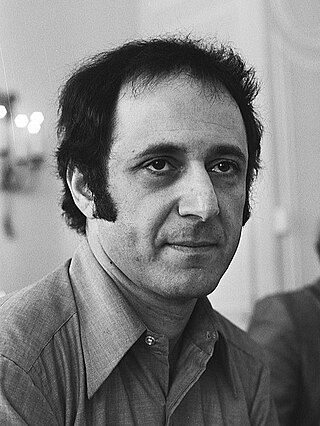
Stephen Michael Reich is an American composer best known as a pioneer of minimal music in the mid to late 1960s. Reich's work is marked by its use of repetitive figures, slow harmonic rhythm, and canons. Reich describes this concept in his essay, "Music as a Gradual Process", by stating, "I am interested in perceptible processes. I want to be able to hear the process happening throughout the sounding music." For example, his early works experiment with phase shifting, in which one or more repeated phrases plays slower or faster than the others, causing it to go "out of phase." This creates new musical patterns in a perceptible flow.

The term string quartet refers to either a type of musical composition or a group of four people who play them. Many composers from the mid-18th century onwards wrote string quartets. The associated musical ensemble consists of two violinists, a violist, and a cellist. The double bass is almost never used in the ensemble mainly because it would sound too loud and heavy.
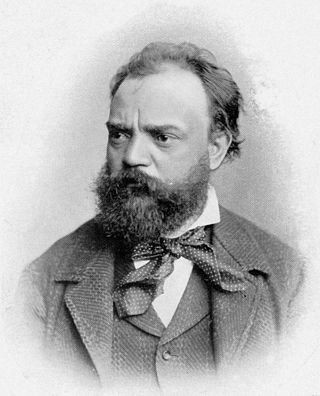
Antonín Leopold Dvořák was a Czech composer. He frequently employed rhythms and other aspects of the folk music of Moravia and his native Bohemia, following the Romantic-era nationalist example of his predecessor Bedřich Smetana. Dvořák's style has been described as "the fullest recreation of a national idiom with that of the symphonic tradition, absorbing folk influences and finding effective ways of using them," and Dvořák has been described as "arguably the most versatile... composer of his time".
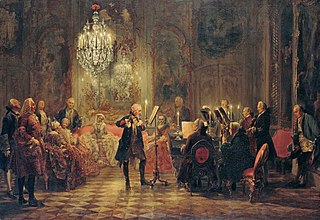
Chamber music is a form of classical music that is composed for a small group of instruments—traditionally a group that could fit in a palace chamber or a large room. Most broadly, it includes any art music that is performed by a small number of performers, with one performer to a part. However, by convention, it usually does not include solo instrument performances.

The Pulitzer Prize for Music is one of seven Pulitzer Prizes awarded annually in Letters, Drama, and Music. It was first given in 1943. Joseph Pulitzer arranged for a music scholarship to be awarded each year, and this was eventually converted into a prize: "For a distinguished musical composition of significant dimension by an American that has had its first performance in the United States during the year."
Ellen Taaffe Zwilich is an American composer, the first female composer to win the Pulitzer Prize for Music. Her early works are marked by atonal exploration, but by the late 1980s, she had shifted to a postmodernist, neoromantic style. She has been called "one of America's most frequently played and genuinely popular living composers." She was a 1994 inductee into the Florida Artists Hall of Fame. Zwilich has served as the Francis Eppes Distinguished Professor at Florida State University.

Milton Byron Babbitt was an American composer, music theorist, mathematician, and teacher. He was a Pulitzer Prize and MacArthur Fellowship recipient, recognized for his serial and electronic music.
Although a concerto is usually a piece of music for one or more solo instruments accompanied by a full orchestra, several composers have written works with the apparently contradictory title Concerto for Orchestra. This title is usually chosen to emphasise soloistic and virtuosic treatment of various individual instruments or sections in the orchestra, with emphasis on instruments changing during the piece. It differs from sinfonia concertante in that it has no soloist or group of soloists that remains the same throughout the composition.

William Howard Schuman was an American composer and arts administrator.
Shulamit Ran is an Israeli-American composer. She moved from Israel to New York City at 14, as a scholarship student at the Mannes College of Music. Her Symphony (1990) won her the Pulitzer Prize for Music. She was the second woman to win the Pulitzer Prize for Music, the first being Ellen Taaffe Zwilich in 1983. Ran was a professor of music composition at the University of Chicago from 1973 to 2015. She has performed as a pianist in Israel, Europe and the U.S., and her compositional works have been performed worldwide by a wide array of orchestras and chamber groups.
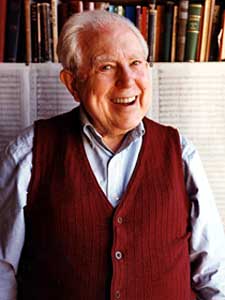
Elliott Cook Carter Jr. was an American modernist composer. One of the most respected composers of the second half of the 20th century, he combined elements of European modernism and American "ultra-modernism" into a distinctive style with a personal harmonic and rhythmic language, after an early neoclassical phase. His compositions are performed throughout the world, and include orchestral, chamber music, solo instrumental, and vocal works. The recipient of many awards, Carter was twice awarded the Pulitzer Prize for his string quartets; he also wrote the large-scale orchestral triptych Symphonia: sum fluxae pretium spei.
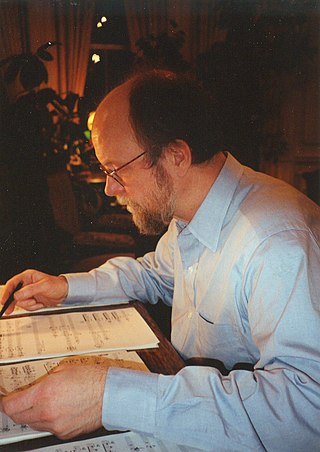
Charles Peter Wuorinen was an American composer of contemporary classical music based in New York City. He also performed as a pianist and conductor. Wuorinen composed more than 270 works: orchestral music, chamber music, solo instrumental and vocal works, and operas, such as Brokeback Mountain. His work was termed serialist but he came to disparage that idea as meaningless. Time's Encomium, his only purely electronic piece, received the Pulitzer Prize. Wuorinen taught at several institutions, including Columbia University, Rutgers University and the Manhattan School of Music.

Julia Wolfe is an American composer and professor of music at New York University. According to The Wall Street Journal, Wolfe's music has "long inhabited a terrain of its own, a place where classical forms are recharged by the repetitive patterns of minimalism and the driving energy of rock". Her work Anthracite Fields, an oratorio for chorus and instruments, was awarded the 2015 Pulitzer Prize for Music. She has also received the Herb Alpert Award (2015) and was named a MacArthur Fellow (2016).
Karel Husa was a Czech-born classical composer and conductor, winner of the 1969 Pulitzer Prize for Music and 1993 University of Louisville Grawemeyer Award for Music Composition. In 1954, he emigrated to the United States and became an American citizen in 1959.
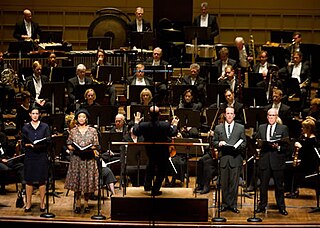
Steven Edward Stucky was a Pulitzer Prize-winning American composer.
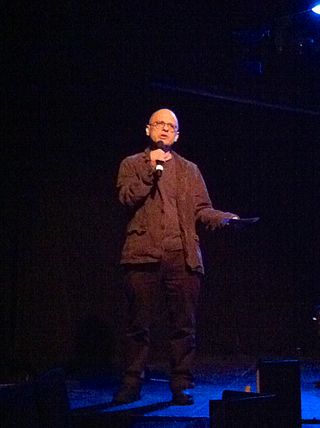
David Lang is an American composer living in New York City. Co-founder of the musical collective Bang on a Can, he was awarded the 2008 Pulitzer Prize for Music for The Little Match Girl Passion, which went on to win a 2010 Grammy Award for Best Small Ensemble Performance by Paul Hillier and Theatre of Voices. Lang was nominated for an Academy Award for "Simple Song #3" from the film Youth.
Bogusław Julian Schaeffer was a Polish composer, musicologist, and graphic artist, a member of the avantgarde "Cracow Group" of Polish composers alongside Krzysztof Penderecki and others.

Leon Kirchner was an American composer of contemporary classical music. He was a member of the American Academy of Arts and Letters and the American Academy of Arts and Sciences, and he won a Pulitzer Prize for his String Quartet No. 3.
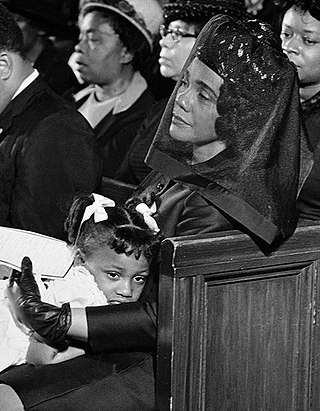
The following are the Pulitzer Prizes for 1969.

Graham Waterhouse, cellist and composer especially of chamber music, has written a number of works for string quartet, three major works in several movements, several smaller works and compositions for a solo instrument and string quartet.
References
- 1 2 Husa, Karel (1968). "String Quartet No. 3". G. Schirmer Inc. Retrieved July 25, 2016.
- ↑ Snow, Shauna (April 27, 1993). "Music". Los Angeles Times . Retrieved July 25, 2016.
- ↑ Bresnick, Martin (May 25, 2011). "Prague 1970: Music in Spring". The New York Times . Retrieved July 25, 2016.
- ↑ Appleford, Steve (March 12, 1993). "MUSIC : Doing His Own Work : Karel Husa will conduct the CSUN Wind Ensemble as it performs pieces by . . . Karel Husa". Los Angeles Times . ISSN 0458-3035. OCLC 3638237. Archived from the original on August 15, 2022. Retrieved August 15, 2022.